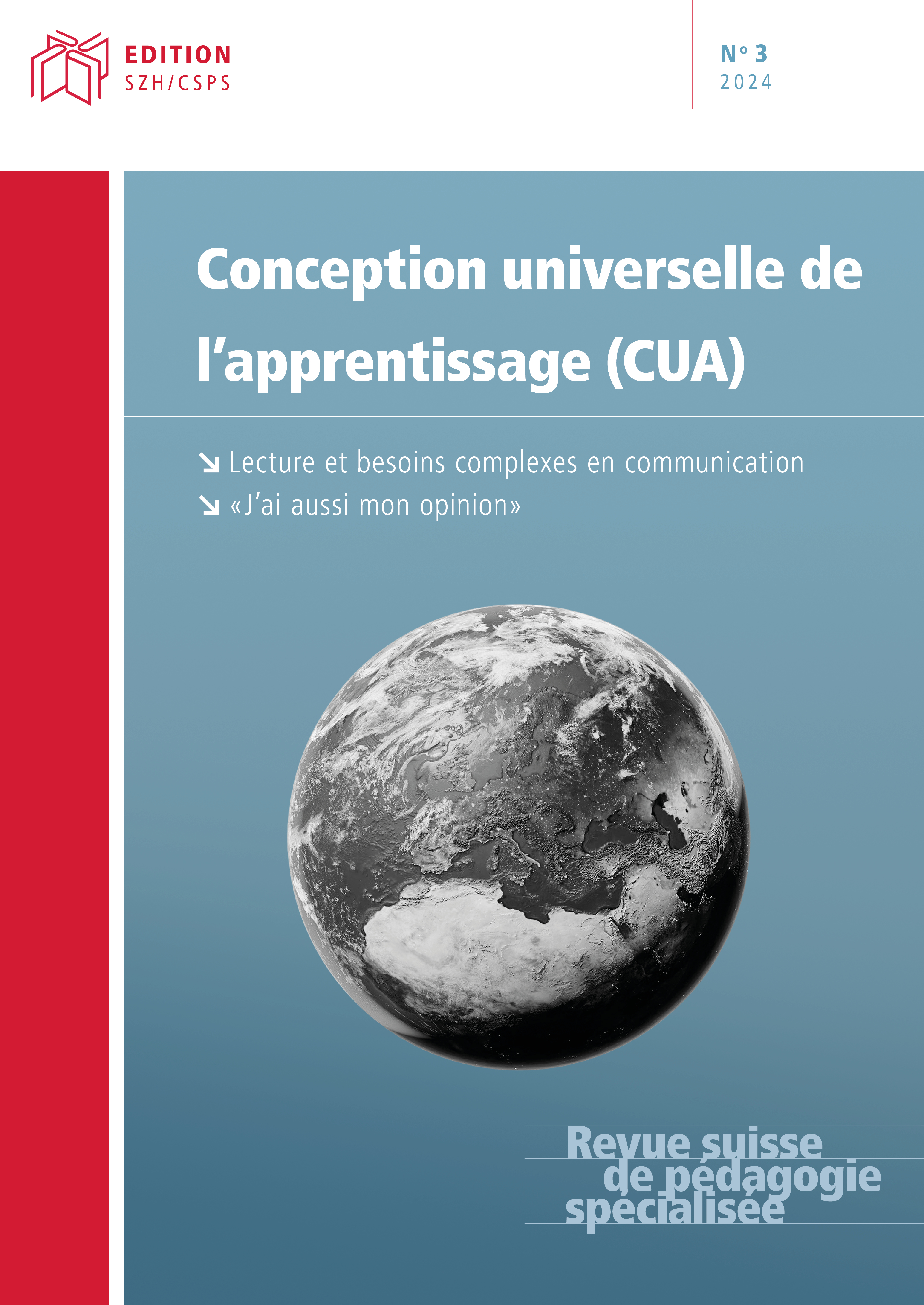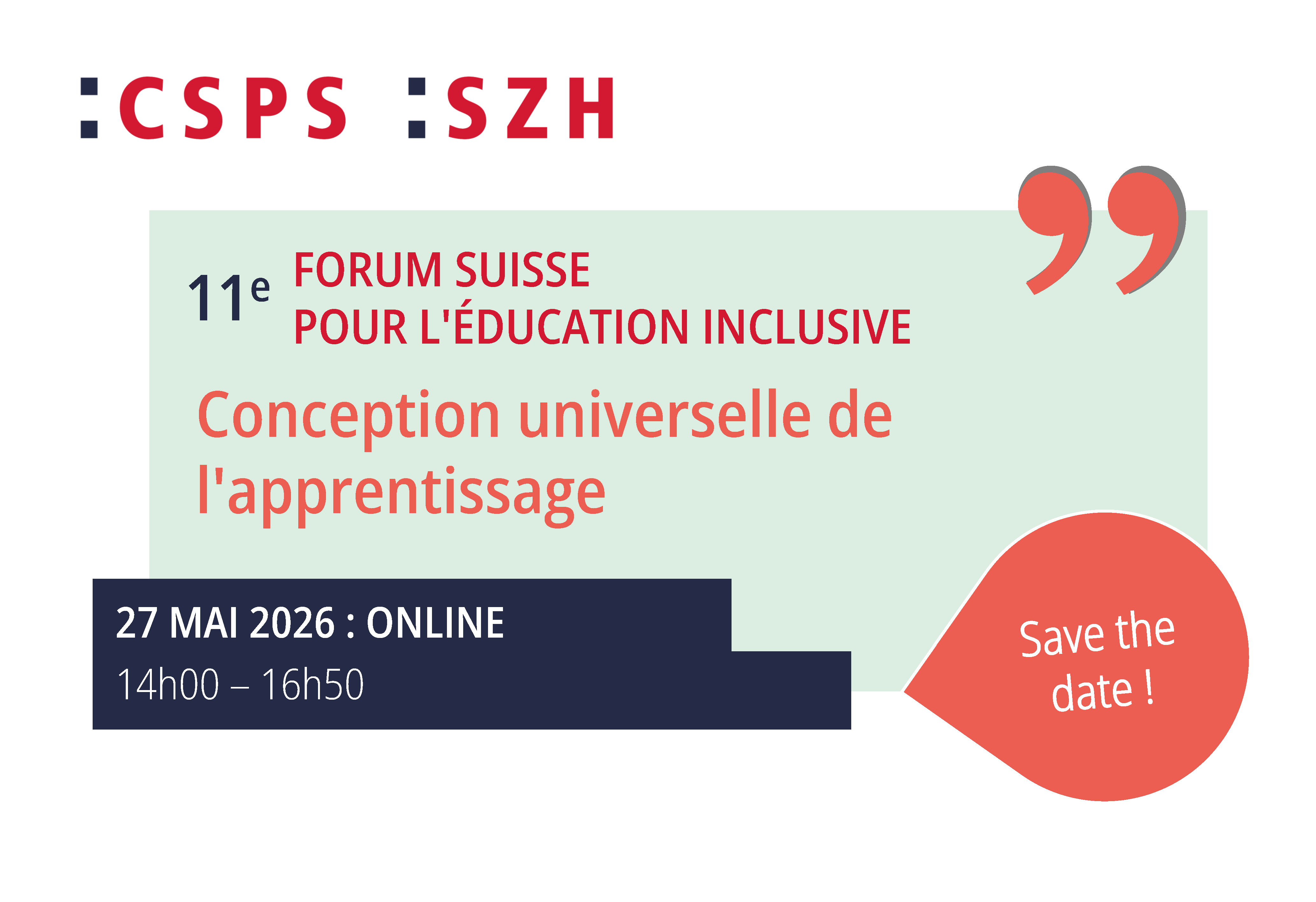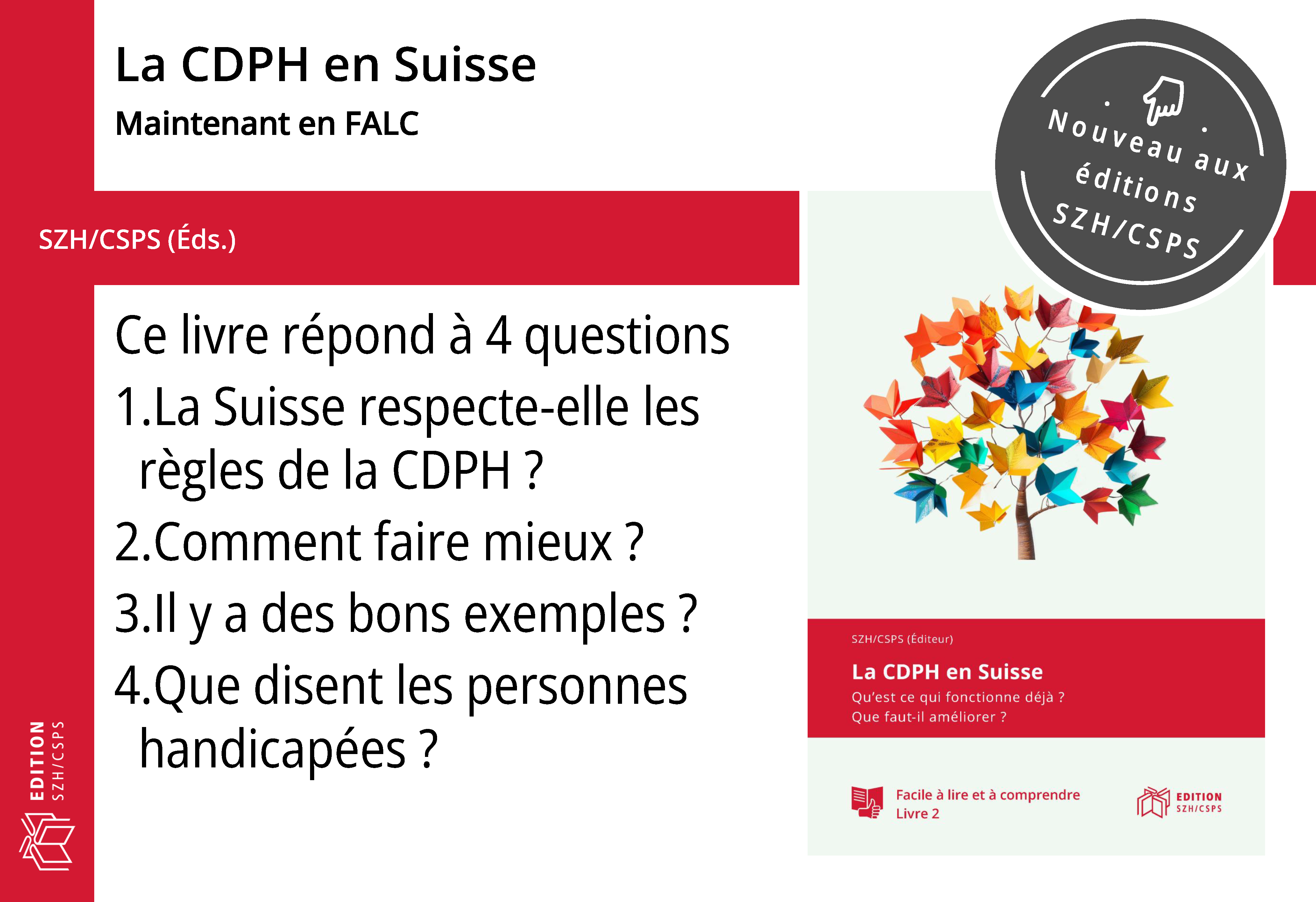La conception universelle de l’apprentissage
D’une vision partagée aux pratiques plurielles, en passant par ses défis
DOI :
https://doi.org/10.57161/r2024-03-01Mots-clés :
Conception universelle de l’apprentissage, inclusion, choix, responsabilisationRésumé
La promesse est forte : la conception universelle de l’apprentissage (CUA) prétend participer à une approche inclusive de l’édu-cation et de la formation, dans laquelle chaque élève peut s’épanouir et apprendre. Pour ce faire, des organisations nouvelles sont conviées, parallèlement à une réattribution de la responsabilité d’apprendre aux bénéficiaires de l’enseignement, alors invité à opérer des choix. Cependant, il relève de l’évidence qu’un tel projet, s’il est retenu, ne se déploiera pas sans écueils, que ça soit pour des raisons de temps, de ressources, de formation ou de complexité. Cet article propose une synthèse de ce que la CUA propose, confronté à ce qu’elle exige.
Références
Barthes, A. (2017). Curriculum caché. In A. Barthes, J.-M. Lange & N. Tutiaux-Guillon (Eds.), Dictionnaire critique des enjeux et concepts des « éducation à » (pp. 617-622). L’Harmattan.
Bergeron, L., Rousseau, N., & Leclerc, M. (2011). La pédagogie universelle : Au cœur de la planification de l’inclusion scolaire. Éducation et Francophonie, 39(2), 87-104. https://doi.org/10.7202/1007729ar
Capp, M. J. (2017). The effectiveness of universal design for learning: A meta-analysis of literature between 2013 and 2016. International Journal of Inclusive Education, 21(8), 791-807. https://doi.org/10.1080/13603116.2017.1325074
CAST. (2024). Universal Design for Learning Guidelines. About Universal Design for Learning. https://www.cast.org/impact/universal-design-for-learning-udl
Centre for Excellence in Universal Design [CEUD]. (2024). The 7 principles. https://universaldesign.ie/about-universal-design/the-7-principles
Charras, K., Depeau, S., Wiss, M., Lebihain, L., Brizard, Y., & Bronsard, G. (2012). L’enfance et l’adolescence in situ : Facteurs environnementaux facilitateurs et inhibiteurs de troubles cognitifs et comportementaux. Pratiques Psychologiques, 18(4), 353-372. https://doi.org/10.1016/j.prps.2011.07.001
Cormier, D. (2008). Rhizomatic Education : Community as Curriculum. Innovate: Journal of Online Education, 4(5). http://nsuworks.nova.edu/innovate/vol4/iss5/2
Cronje, J. C. (2016). Twenty-first-Century Learning, Rhizome Theory, and Integrating Opposing Paradigms in the Design of Personal Learning Systems. In M. J. Spector, B. B. Lockee & M. D. Childress (Eds.), Learning, Design, and Technology (pp. 1-22). Springer International Publishing. https://doi.org/10.1007/978-3-319-17727-4_49-1
De Bruyckere, P., Kirschner, P. A., & Hulshof, C. (2020). More Urban Myths About Learning and Education Challenging Eduquacks, Extraordinary Claims, and Alternative Facts. Routledge.
Degenhardt, S. (2020). Elementare Berrierefreiheit in Bildungsbauten. Books on Demand.
Florian, L. (2007). Reimagining special education. In L. Florian (Ed.), The SAGE Handbook of Special Education (pp. 7–20). Sage.
Galkiene, A., & Monkeviciene, O. (2021). Preconditions of Transforming the Educational Process by Applying Inclu-sive Educational Strategies: Theoretical Background. In A. Galkiene & O. Monkeviciene, (Eds.), Improving In-clusive Education through Universal Design for Learning (pp. 1-21). Springer.
Graham, L. J., Medhurst, M., Malaquias, C., Tancredi, H., De Bruin, C., Gillett-Swan, J., Poed, S., Spandagou, I., Car-rington, S., & Cologon, K. (2023). Beyond Salamanca: A citation analysis of the CRPD/GC4 relative to the Sal-amanca Statement in inclusive and special education research. International Journal of Inclusive Education, 27(2), 123-145. https://doi.org/10.1080/13603116.2020.1831627
Grant, K., & Perez, L. (2018). Dive into UDL. Immersive Practices to Develop Expert Learners. ISTE.
Hart, C. S. (2012). The capability approach and education. Cambridge Journal of Éducation, 42(3), 275-282. https://doi.org/10.1080/0305764X.2012.706393
Högberg, B., & Lindgren, J. (2021). Outcome-based accountability regimes in OECD countries: A global policy mod-el? Comparative Education, 57(3), 301-321. https://doi.org/10.1080/03050068.2020.1849614
Hornby, G., & Kauffman, J. M. (2023). Special education’s zombies and their consequences. Support for Learning, 38(3), 135-145. https://doi.org/10.1111/1467-9604.12451
Katz, J. (2015). Implementing the Three Block Model of Universal Design for Learning: Effects on teachers’ self-efficacy, stress, and job satisfaction in inclusive classrooms K-12. International Journal of Inclusive Éducation, 19(1), 1-20. https://doi.org/10.1080/13603116.2014.881569
Kennedy, J., Missiuna, C., Pollock, N., Wu, S., Yost, J., & Campbell, W. (2018). A scoping review to explore how uni-versal design for learning is described and implemented by rehabilitation health professionals in school set-tings. Child: Care, Health and Developmentre Health, 44(5), 670-688. https://doi.org/10.1111/cch.12576
Khine, M. S. (2023). Rhizome Theory and Twenty-First Century Learning. In M. S. Khine (Ed.), Rhizome Metaphor: Legacy of Deleuze and Guattari in Education and Learning (pp. 1-6). Springer.
Lillejord, S. (2020). From “unintelligent” to intelligent accountability. Journal of Educational Change, 21(1), 1–18. https://doi.org/10.1007/s10833-020-09379-y
Meyer, A., Rose, D. H., & Gordon, D. (2014). Universal Design for Learning. Theory and practice. CAST incorporated.
Murawski, W. W., & Ricci, L. A. (2019). UDL and Co-Teaching. In W. W. Murawski & K. L. Scott (Eds.), What Really Works with universal design for learning (pp. 141-156). Corwin.
Nussbaum, M. C. (2011). Capabilité. Comment créer les conditions d’un monde plus juste ? Climats.
Ok, M. W., Rao, K., Bryant, B. R., & McDougall, D. (2017). Universal Design for Learning in Pre-K to Grade 12 Class-rooms: A Systematic Review of Research. Exceptionality, 25(2), 116-138. https://doi.org/10.1080/09362835.2016.1196450
Persson, H., Åhman, H., Yngling, A. A., & Gulliksen, J. (2015). Universal design, inclusive design, accessible design, design for all: Different concepts—one goal? On the concept of accessibility—historical, methodological and philosophical aspects. Universal Access in the Information Society, 14(4), 505-526. https://doi.org/10.1007/s10209-014-0358-z
Proyer, M., Kremsner, G., & Biewer, G. (2021). Good Practice in Inclusive Education: Participatory Reinterpretation of Already Existing Elaborate Classroom Practices Under a UDL Perspective. In A. Galkienė & O. Monkevičienė (Eds.), Improving Inclusive Education through Universal Design for Learning (pp. 279-312). Sprin-ger International Publishing.
Senécal, I., Brazeau, C., & Quirion, I. (2018). La pédagogie inclusive : Conception universelle de l’apprentissage. Sainte-Anne. https://innovation.sainteanne.ca/wp-content/uploads/2018/03/Conception_universelle_apprentissage.pdf
Tremplay, S. (2013). La conception universelle de l’apprentissage en enseignement supérieur : Principes, applications et approches connexes. Revue de littérature. UQAM, Cégep du Vieux Montréal, Cégep Marie-Victorin, Université de Montréal, CRISPESH, Collège Montmorency.
Verger, A., Ferrer-Esteban, G., & Parcerisa, L. (2021). In and out the “pressure cooker”: Schools’ varying responses to accountability and datafication. In S. Grek, C. Maroy & A. Verger (Eds.), World Yearbook of Education 2021. Accountability and Datafication in the Governance of Education (pp. 241-261). Routledge.
Witten, U. (2021). Barrierefrei im Digitalen? Behindertwerden sowie Möglichkeiten der Überwindung von Barrieren im Kontext des Digitalen. Zeitschrift für Disability Studies, 1(1), 1-13. https://doi.org/10.15203/ZDS_2021_1.03
Yu, J., Wei, X., Hall, T. E., Oehlkers, A., Ferguson, K., Robinson, K. H., & Blackorby, J. (2021). Findings From a Two-Year Effectiveness Trial of the Science Notebook in a Universal Design for Learning Environment. Frontiers in Education, 6, 719672. https://doi.org/10.3389/feduc.2021.719672
Publiée
Comment citer
Numéro
Rubrique
Licence
© Lionel Alvarez 2024

Ce travail est disponible sous la licence Creative Commons Attribution 4.0 International .




